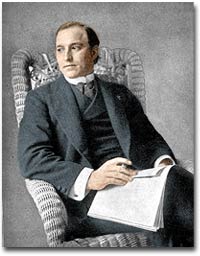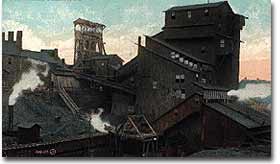43c. A Helping Hand for Labor

John Mitchell led the United Mine Workers through the 5-1/2 month long anthracite coal strike of 1902.
Workers rarely found a helping hand in the White House. President Hayes ordered the army to break the Great Railroad Strike of 1877. President Cleveland ordered federal troops to disrupt the Pullman Strike of 1894. Governors and mayors used the National Guard and police to confront workers on strike.
When Pennsylvania coal miners went on strike in 1902, there was no reason to believe anything had changed. But this time things were different. Teddy Roosevelt was in the White House.
Miners and Owners at Loggerheads
John Mitchell, president of the United Mine Workers, represented the miners. He was soft-spoken, yet determined. Many compared his manner to Abraham Lincoln's. In the spring of 1902, Mitchell placed a demand on the coal operators for better wages, shorter hours, and recognition of the union. The owners, led by George Baer, flatly refused. On May 12, 1902, 140,000 miners walked off the job, and the strike was on.
Mitchell worked diligently behind the scenes to negotiate with Baer, but his efforts were rejected. According to Baer, there would be no compromise. Even luminaries such Mark Hanna and J.P. Morgan prevailed in vain on the owners to open talks. As the days passed, the workers began to feel the pinch of the strike, and violence began to erupt.
Soon summer melted into fall, and President Roosevelt wondered what the angry workers and a colder public would do if the strike lasted into the bitter days of winter. He decided to lend a hand in settling the strike.
Teddy the Arbitrator
No President had ever tried to negotiate a strike settlement before. Roosevelt invited Mitchell and Baer to the White House on October 3 to hammer out a compromise. Mitchell proposed to submit to an arbitration commission and abide by the results if Baer would do the same. Baer resented the summons by the President to meet a "common criminal" like Mitchell, and refused any sort of concession.
Roosevelt despaired that the violence would increase and spiral dangerously toward a class-based civil war. After the mine operators left Washington, he vowed to end the strike. He was impressed by Mitchell's gentlemanly demeanor and irritated by Baer's insolence. Roosevelt remarked that if he weren't president, he would have thrown Baer out of a White House window.

This frightening-looking structure is a coalbreaker, located in Scranton, PA.
He summoned his War Secretary, Elihu Root, and ordered him to prepare the army. This time, however, the army would not be used against the strikers. The coal operators were informed that if no settlement were reached, the army would seize the mines and make coal available to the public. Roosevelt did not seem to mind that he had no constitutional authority to do any such thing.
Compromise
J.P. Morgan finally convinced Baer and the other owners to submit the dispute to a commission. On October 15, the strike ended. The following March, a decision was reached by the mediators. The miners were awarded a 10 percent pay increase, and their workday was reduced to eight or nine hours. The owners were not forced to recognize the United Mine Workers.
Workers across America cheered Roosevelt for standing up to the mine operators. It surely seemed like the White House would lend a helping hand to the labor movement.






